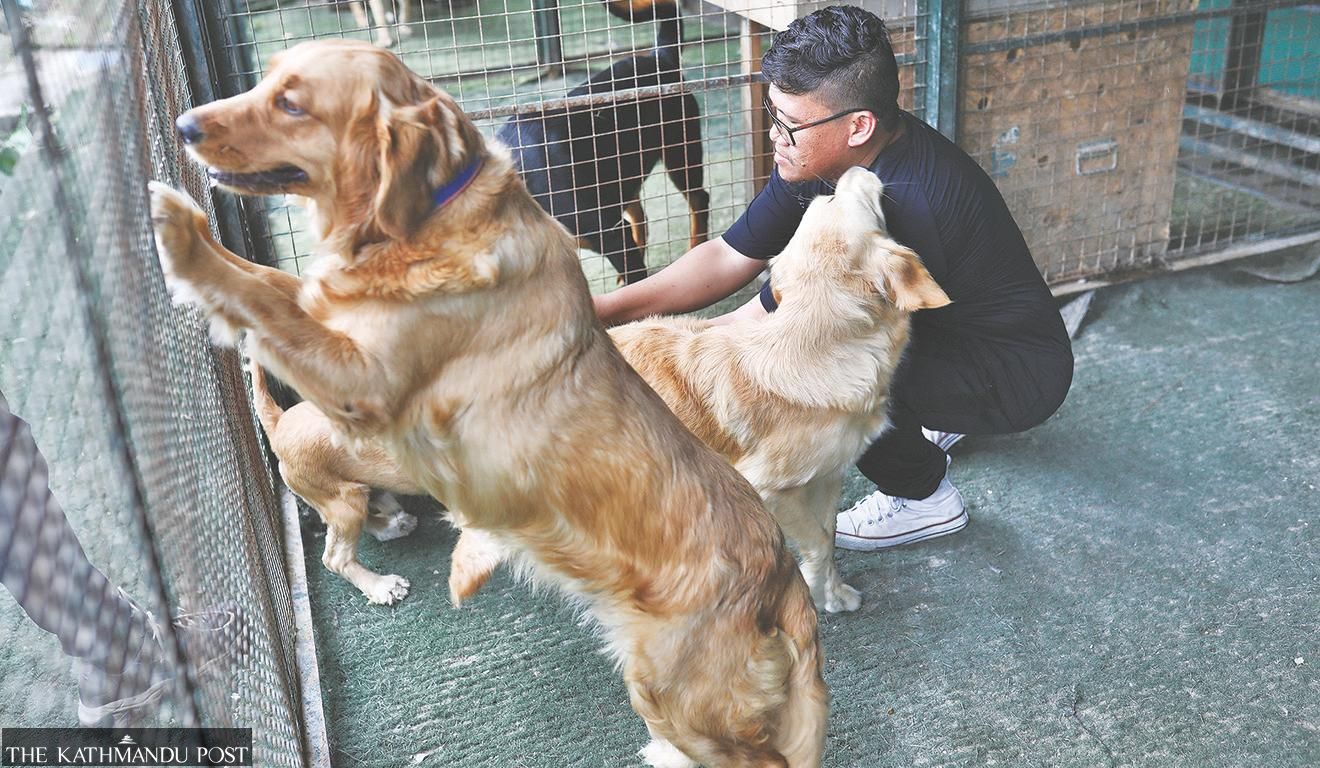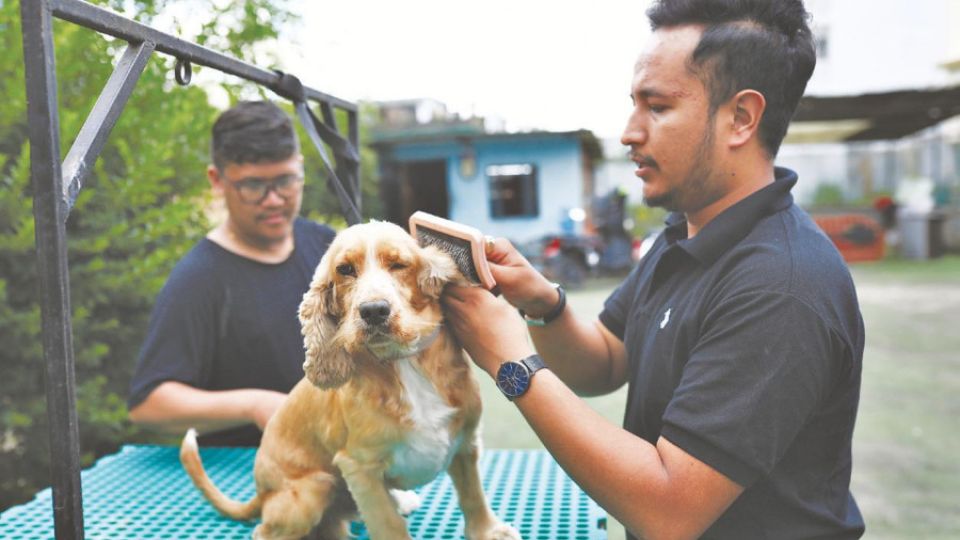October 10, 2022
KATHMANDU – Until a year ago Suraj Maharjan and his family members, all avid dog lovers, would worry for days before festivals like Dashain. Sometimes they would even have to cancel their travel plans during festivals and other vacations.
The reason was their dog. In their absence, they had no one in Kathmandu to take care of their beloved pet, Pintu, a Golden Retriever.
“We couldn’t leave our dog alone at home,” said Maharjan, 27, a restaurant owner in Kirtipur. “The puppy has become an integral part of our family. All the members share a very strong bond with him.”
But this year, Maharjan’s family is relieved because of the easy availability of dog hostels in Kathmandu these days. Maharjan says that earlier he had only heard of hostels for boys and girls. But when he first read about a dog hostel on social media, it swiftly drew his attention. He then inquired about it and visited the hostel. Upon observation, he was convinced about the care and safety of his dog. He therefore left the pet there before his entire family went out of the Valley for two weeks.
“Two months ago, I left my Pintu at Golden Champaign Kennel, and when I was back I could observe some positive changes in him,” said Maharjan, adding that Pintu used to be aggressive when it was being fed, a trait that the pet had now shed off. “He was trained to socialise during the stay at the Kennel,” Maharjan said.
This Dashain as well, Maharjan had booked a seat for his dog at a hostel as he and his family members were visiting Pokhara for two weeks.
Although dog hostels or day care centres are common in developed countries, they are a relatively new phenomenon in developing ones. This practice has gradually gained ground in Nepal—though, as of now, their popularity seems to be limited to Kathmandu—much to the relief of dog-loving busy professionals. The importance, and relevance, of such hostels has increased significantly with the rising number of professionals and nuclear families in cities.
The Nepal Veterinary Association took notice of dog hostels in Kathmandu around 2019, just before the Covid-19 pandemic struck. The association estimates that currently there are only about half-a-dozen professionally established hostels for dogs in Kathmandu. There are also some people providing such services as a side business, according to the association.
“Dog hostels have been mighty handy for the families and individuals who can’t carry their dogs with them during their journeys,” said Sital Kaji Shrestha, president of the association.
Many dog lovers are happy. But they also question the reliability and quality of the services on offer.
“It’s a good thing that there are multiple hostel options for dogs now but the question is, are the dogs getting to socialise as they should in these places?” said Shivani Chemjong, communication and campaigns lead at WaterAid Nepal and a self-described ‘pug mom’.
Chemjong, who owns a pug named ‘maila’, says that those who want to run a dog hostel should employ trained people who are familiar with the pets’ psychology.
“I still can’t fully trust such hostels as many of them still limit dogs to cages,” Chemjong said. “I haven’t left my dog in such places but I might reconsider if I find a trustworthy hostel.”
Chemjong noted how it is a common practice in developed countries to leave dogs at daycare centres during office hours.
“Dog lovers consider pets an integral part of their family and pet care is a matter of serious concern for them,” she added.
Shrestha, president of the association, underscored the need for an effective system to monitor such hostels. The government, however, does not have any guidelines to run them, he said.
“The dog hostels are being operated like hotels for boys and girls. What we need are separate guidelines,” Shrestha said, “ones that would categorically define the criteria for space, foods, hygiene and other issues.”
In the Valley, the charge for keeping canines in hostels varies from Rs800 to Rs1,200 a day. Besides the hostels, there are also some people who provide such services from their own homes. Ram Hari Subedi, 50, from Gongabu of Tokha Municipality, is one of them.
“I am a veterinarian by profession, and almost every household in my area owns a dog,” Subedi said. “They bring their pets here for treatment and if they are leaving the Valley, they prefer to keep their dogs at my place as I know how to take care of them.”
Subedi, however, doesn’t call his home a dog hostel. “I am doing this just to help people and to earn some additional money,” he said.
Subedi has five cages at his home and charges up to Rs1,200 for a day, based on the size, age and breed of a dog that needs to be taken care of.

Dogs are cared for at Golden Champions Kennel Dog Hostel in Hattigauda. Post Photo: Sanjog Manandhar
Sangam Lama, one of the owners of Golden Champaign Kennel in Hattigauda who provided shelter to Maharjan’s dog mentioned at the top of the article, said the job was a serious business for her.
She said she has two other partners and runs the hostel professionally.
“Although the government has not given us any guidelines, we have our own standards and are very sensitive toward dogs, because we all are dog lovers,” said Lama, who has been running the hostel for the past three years. The hostel has increased its staff, to half-a-dozen now, and its customer base has also risen. “Earlier, when we started our dog hostel, we would get a maximum of 10 dogs—
this Dashain, we got requests to accommodate 30 dogs.”
She said the hostel can house up to 20 dogs now and is looking to further expand the capacity. The hostel also has a separate team of veterinary experts who examine the dogs’ health, their history, age and food habits before admitting them.
“We admit dogs to our hostel only after getting all the details,” Lama said. “And once we keep the pet here, we give daily updates on the dogs to the owners.”
Shrestha, the association president, however, says the hostel’s internal rules aren’t enough and government-sanctioned guidelines are necessary.
The Department of Livestock Services should take the initiative in this regard, he said.
“The rise in the number of dog hostels will also help reduce the number of stray dogs as some busy people leave pet dogs on the road because they can’t look after them all the time,” Shrestha said. “If they have the option of leaving their pets at a hostel or daycare centre, they won’t be compelled to abandon them.”


